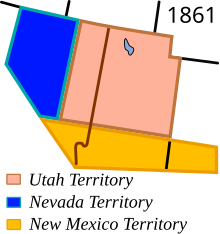Nevada Territory
| Territory of Nevada | |||||||||
|---|---|---|---|---|---|---|---|---|---|
| Organized incorporated territory of the United States | |||||||||
| 1861–1864 | |||||||||
 The Nevada Territory in 1861, with the Utah and New Mexico Territories | |||||||||
| Capital | Genoa (1861) Carson City (1861–1864) | ||||||||
| • Type | Organized incorporated territory | ||||||||
| History | |||||||||
• Organic act | 2 March 1861 | ||||||||
| 31 October 1864 | |||||||||
| |||||||||
The Territory of Nevada (N.T.)[1][2] was an organized incorporated territory of the United States that existed from March 2, 1861,[3] until October 31, 1864, when it was admitted to the Union as the State of Nevada.
Prior to the creation of the Nevada Territory, the area was part of western Utah Territory and was known as Washoe, after the native Washoe people. The separation of the territory from Utah was important to the federal government because of its political leanings, while the population itself was keen to be separated because of animosity (and sometimes violence) between non-Mormons in Nevada and Mormons from the rest of the Utah Territory.
History
[edit]| Year | Pop. | ±% |
|---|---|---|
| 1860 | 6,857 | — |
| Source: 1860;[4] | ||
The eastern boundary of Nevada Territory had been defined as the 39th meridian, but when gold discoveries were made further to the east, the Nevada territorial delegation to the United States Congress at the U.S. Capitol in Washington, D.C. requested that the boundary be moved to include the new strikes and diggings, further east by one degree to the 38th meridian, which Congress granted in 1862. The border was then later shifted again four years later further east by one more degree to now the 37th meridian, in 1866, in part due to the discovery of even more gold deposits. These eastward shifts took land away from the older Utah Territory.
The southern border of Nevada Territory had been defined originally as the 37th parallel, but also in 1866, Nevada's elected senators and representatives asked the Congress in Washington to move the southern border further south to the Colorado River. Congress also granted this request the following session in the year1867, giving to the state of Nevada all of the western triangular-shaped end taken from the then four-year old federal Arizona Territory. Arizona Territory's delegates strongly protested, but found little sympathy in Congress due in part to part because part of the population of the Territory having sympathized with the South in the recent Civil War, when the southern third of the larger 1850 New Mexico Territory east of Nevada, was invaded in 1862 by Confederate States Army troops from El Paso, Texas (to the east), marching north up the Rio Grande river valley towards the New Mexican capital of Santa Fe and its commanders declared the area to be established the Confederate Territory of Arizona, having aligned / annexed with the southern Confederacy during the American Civil War, and sent delegates further east to sit in the Confederate States Congress in their capital of Richmond, Virginia, so the resentment and negative response now a decade later in the federal halls of Congress was still strong.[5]
The exact location of the due north-south runninfyrthg California–Nevada border, between Lake Tahoe and the intersection further up with the southern boundary of Oregon at the 42nd parallel, was contentious and was surveyed and re-surveyed decades later well into the 20th century.[6]
Congress transferred some of the lands west of the Colorado River including Pah-Ute County, Arizona Territory to the then two-year old State of Nevada on May 5, 1866. Part of this southern tip of Nevada was established as Clark County in 1909 and contains the modern city of Las Vegas.
The territorial capital was moved from the provisional capital of Genoa, west of Reno to Carson City, the new and permanent territorial / state capital for 163 years ever since, where the new Nevada State Capitol was built. Governor James Warren Nye (1815-1876, served 1861-1864), (and later selected as Nevada's U.S. Senator), appointed as territorial governor by 16th President Abraham Lincolnand confirmed by the Senate. He succeeded Isaac Roop (1822-1869, served 1859-1861), the earlier first provisional territorial governor, and therefore Governor Nye became the only territorial governor to serve before statehood. The appointed secretary of the territory was Orion Clemens (1825-1897, served 1861-1864) (older brother of famed author, humorist and lecturer Samuel Clemens (1835-1910), also known world-wide with the pen name of Mark Twain), who more or less served often as acting governor on the scene in Carson City in Nye's constant and frequent absences.
See also
[edit] Nevada portal
Nevada portal United States portal
United States portal History portal
History portal- California Trail
- Great Basin
- Historic regions of the United States
- History of Nevada
- Territorial evolution of the United States
- Mexican Cession, 1848
- State of Deseret, 1849–1850 (extralegal)
References
[edit]- ^ The abbreviation "N. T." was often used and can be seen on many mining claims.
- ^ "California Digital Newspaper Collection".
- ^ 12 Stat. 209
- ^ Forstall, Richard L. (ed.). Population of the States and Counties of the United States: 1790–1990 (PDF) (Report). United States Census Bureau. p. 3. Retrieved May 18, 2020.
- ^ Stein, Mark (2008). How the States Got Their Shapes. HarperCollins. pp. 176–177. ISBN 978-0-06-143138-8 g.
{{cite book}}: Check|isbn=value: invalid character (help) - ^ Template:Cite news=Henry
External links
[edit]
- States and territories established in 1861
- States and territories disestablished in 1864
- Nevada Territory
- Pre-statehood history of Nevada
- 1860s in Nevada
- 1861 establishments in Nevada Territory
- 1861 establishments in New Mexico Territory
- 1861 establishments in Utah Territory
- 1864 disestablishments in the United States
- Former organized territories of the United States
- History of Nevada
- History of the American West
- New Mexico Territory
- Utah Territory

